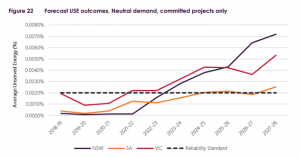AEMO released their latest Electricity Statement of Opportunity (ESOO) earlier today. Unlike the previous ESOO and the more recent Integrated System Plan (ISP), AEMO is now expecting a heightened probability of the reliability standard not being met. The ISP was released only two months ago and showed that it was highly improbable that the reliability standard would be breached. The reliability standard is a technical standard which basically mandates that no more than 0.002% of demand in a given region can go unmet in a financial year.
The reliability of the system raised two questions:
- Why did AEMO rush through new legislation which allows it to spend money on the Reliability and Emergency Reserve Trader (RERT) scheme?
- What really is the point of the reliability guarantee in the National Energy Guarantee (NEG)?
AEMO managed to by-pass normal rules for changing regulations in the National Electricity Market earlier in the year. This was done to allow an extension of the very expensive RERT scheme. At the time, it was criticised by some parties that normal due process was not followed particularly given that AEMO themselves were not forecasting the need for the RERT. Despite the concerns, the changes to the rules were passed and AEMO was provided the extra powers to be the reserve trader. Now, somewhat conveniently, they expect that they need those powers, giving a 20% chance that the reliability standard cannot be met without it in Victoria during the FY18-19 (as shown below). It is expected that Victoria will only just scrape in under the reliability standard as it is.
Source: AEMO
On the second point, it is assumed that AEMO did not expect a change in Government. Just as the reliability obligation was being questioned in the NEG, AEMO is able to show that in FY21-22, or 3 years time, i.e. the first year the reliability obligation could trigger, Victoria will not meet the reliability standard. This means that AEMO can ask for the reliability obligation to be triggered if their forecast persists. It should be noted that New South Wales is not far behind with a breach of the standard in FY23-24.
AEMO has increasingly been intervening in the market and it looks like it continues to build a case to move towards a more centrally controlled market. For now, it may have to wait, with NEG as the policy looking to be political poison. Perhaps today’s resignation from Andy Vesey (CEO of AGL) comes more from the ESOO than the political landscape.
If you have any questions regarding AEMO’s ESOO or how you can best position your company in response to the changing energy market please get in contact with Edge on 07 3905 9220 or 1800 334 336.

